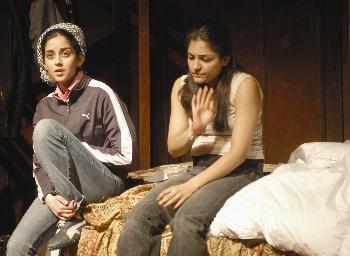
News
Cambridge Residents Slam Council Proposal to Delay Bike Lane Construction

News
‘Gender-Affirming Slay Fest’: Harvard College QSA Hosts Annual Queer Prom

News
‘Not Being Nerds’: Harvard Students Dance to Tinashe at Yardfest

News
Wrongful Death Trial Against CAMHS Employee Over 2015 Student Suicide To Begin Tuesday

News
Cornel West, Harvard Affiliates Call for University to Divest from ‘Israeli Apartheid’ at Rally
ARTSMONDAY: Agenda Hinders Solid Storytelling
Agenda to promote religious understanding dampens play's second half

Sahar, the main character in “Raisins, Not Virgins,” has a copy of “The Idiot’s Guide to Understanding Islam” on her bedside table. At times, the play seems to be excerpted from that guide, with inter-religious understanding and acceptance often taking priority over entertainment.
This can hardly be a criticism, however, when it is the stated goal of one of the organizations presenting the play. “Raisins, Not Virgins” is the fourth collaboration of the Harvard South Asian Association (SAA) and the Boston-based South Asian American Theater (SAATh). The program states that “SAATh resolves to confront all forms of fundamentalism dividing our world by race, religion, gender, class or nation,” and the play clearly succeeds in that goal.
This success, however, occasionally comes at the price of storytelling. Playwright Sharbari Ahmed created a play in which every individual scene works well, but it doesn’t quite mesh. “Raisins, Not Virgins” tells the story of a young New York professional, Muslim by birth but ambivalent about religion, who is pulled in different directions by her pushy yet loving mother, her boyfriend, and his family.
If that set-up seems like the makings of a sweetly amusing romantic comedy, it is—for about half the play. Sahar (played by Aditi Mallick ’08) and Rizwan (Neilesh Bose) meet, fall in love, and trade witty barbs while dealing with aggravating yet amusing family members like Mohammad Chip, an in-law and recent over-enthusiastic convert to Islam.
The play takes a turn for the serious, however, as Rizwan follows Mohammad Chip’s lead, leaving for Palestine to become a member of a resistance group, a move that doesn’t fit with what we know about the until now laid-back character. Meanwhile, Sahar encounters another guy (Aaron, played by Mike Dwan), and the romantic comedy continues. The powerful scenes in which she confronts the existence of fundamentalism— wrestling with whether wearing a headscarf is demeaning and the reasons for her anger at organized religion—co-exist uneasily with genuinely funny scenes in which she flirts playfully with Aaron and has to clear up misunderstandings with her mother.
The cast impressively succeeds in dealing with the extreme emotional and tonal shifts of the play. Every character is believable in any given scene, whether the character’s arc is logical or not. Faatin Chaudhury, as Sahar’s mother, especially hits the right mixture of wisdom and stubbornness, allowing her to be the play’s stable center, even though most of her appearances are on a landing to one side of the stage.
The production makes good use of the space it occupies in Leverett Old Library, as characters frequently use the stairs that flank the main space, stand on the landing to represent distance in phone conversations, and move around the majority of the ample stage.
Using space well is especially important because the set, while detailed, only represents Sahar’s apartment; the action, however, ranges from Central Park to the Middle East and even includes shifts between real events and monologues to the audience. These shifts are almost always made clear through the script, movement, and lighting.
The lighting in “Raisins, Not Virgins” deserves special mention. Harvard Law School student Shankar Duraiswamy, the lighting designer, uses spotlights in the same scene as standard lighting to highlight characters, and occasionally drenches the stage in red. Without going over the top, he accentuates the characters’ emotions in each scene.
Well-produced and well-directed, “Raisins, Not Virgins” is an effective and thoughtful examination of the issues facing contemporary Islam. It is also an entertaining romantic comedy. But its weakness lies in trying to be both at once. To that end, “Raisins, Not Virgins” is a play well worth seeing if you don’t mind coming for one play and staying for two.
Want to keep up with breaking news? Subscribe to our email newsletter.
